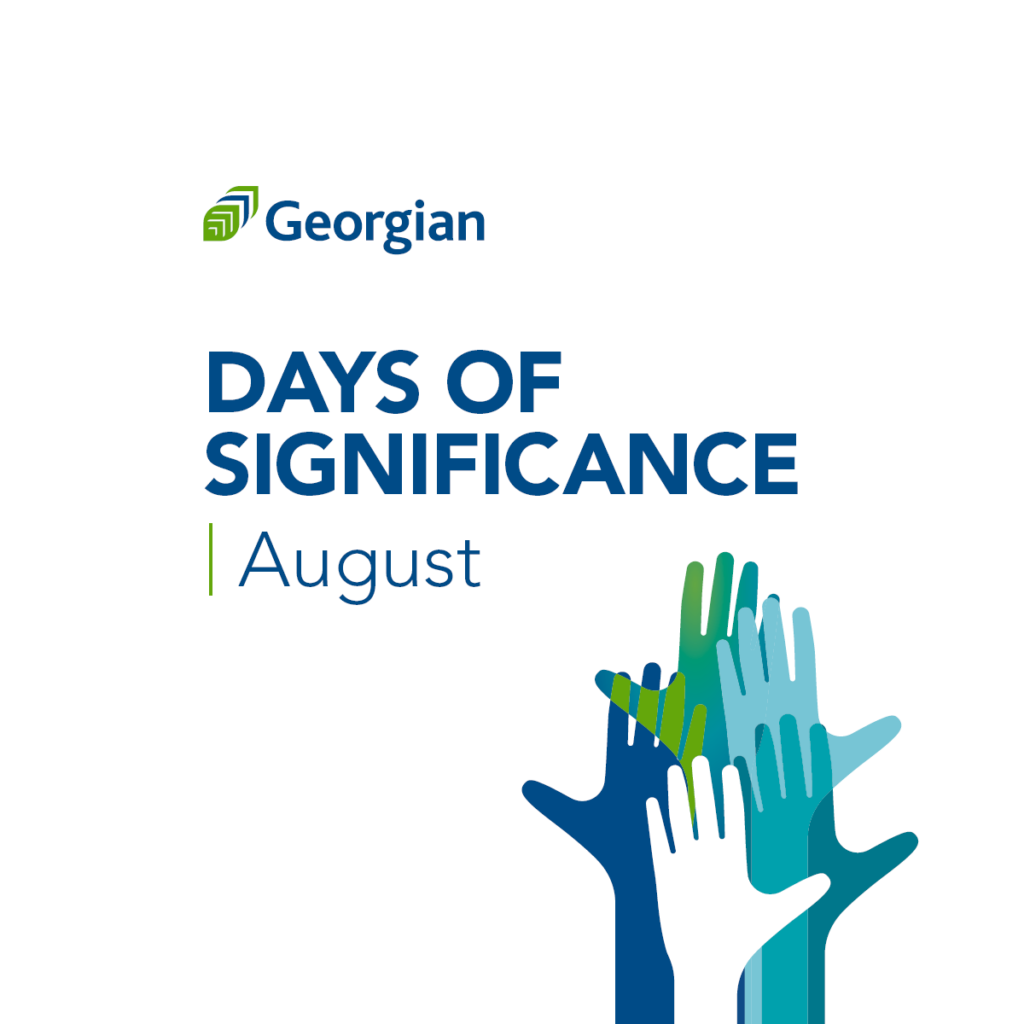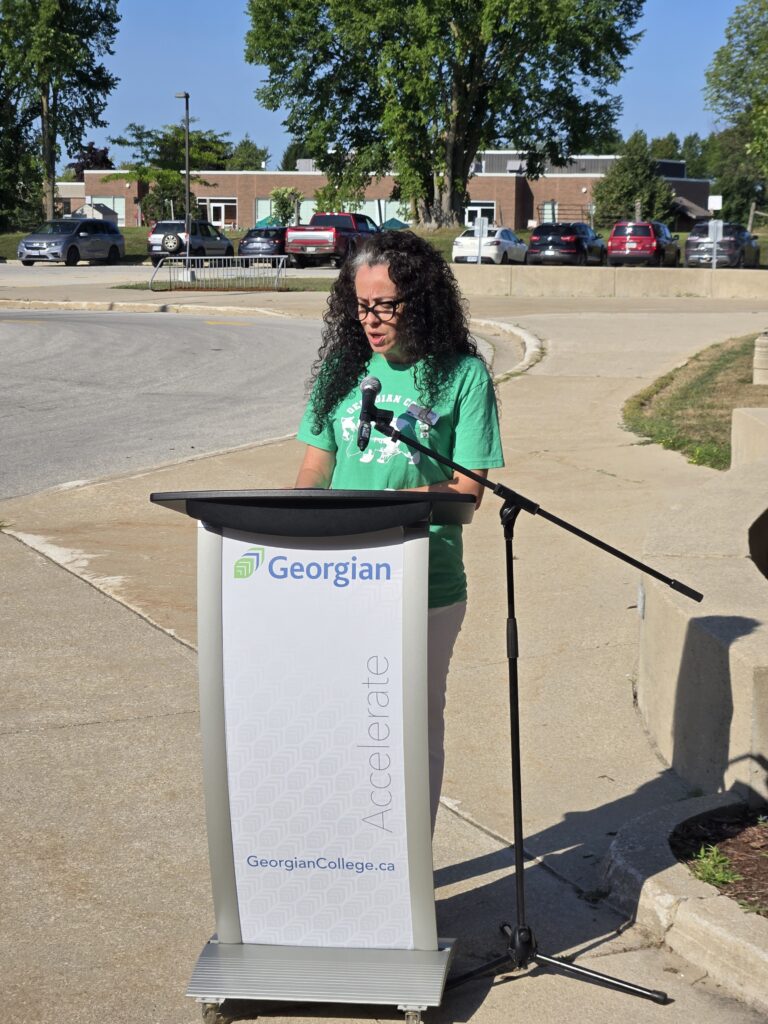Days of significance: August 2025
July 28, 2025
Equity, diversity, inclusion and belonging (EDI&B) is a strategic priority at Georgian. We’re dedicated to fostering a learning and working environment where everyone feels seen, heard and knows they belong through demonstrable, accountable and system-wide commitments to diversity, de-colonization, anti-racism, equity and inclusion. This days of significance calendar lists the days and months that are recognized within the Georgian community.
There are several dates each month that are recognized, observed and celebrated across Canada and internationally, and we encourage everyone to self-educate by referring to these great resources:
- Canadian important and commemorative days.
- UN International Days and Weeks.
- Canadian Centre for Diversity and Inclusion diversity calendar.
Discover what’s going on in August, find ways to get involved and participate in events or activities, and learn through various resources.

Aug. 1 – Emancipation Day
In March 2021, the House of Commons officially recognized Aug. 1 as Emancipation Day in Canada, commemorating the 1834 Slavery Abolition Act which ended slavery across the British Empire. Though slavery existed in Canada for over 200 years, its history—and the enslavement of both Black and Indigenous peoples—remains largely unknown to many Canadians.
Owen Sound holds particular significance in this history. It was the northernmost destination of the Underground Railroad and first celebrated Emancipation Day in 1836. Since 1862, the city has hosted the annual Emancipation Festival at Harrison Park, which continues this year from Aug. 1 to 3. The festival pays tribute to those who made the journey to freedom and celebrates culture, community and the legacy of Black Canadians.
We encourage our community to take time to reflect on this important part of Canadian history. Learn about the contributions of Black settlers to Grey and Simcoe Counties and recognize the strength, perseverance and vibrancy of Black communities—past and present.
It’s also crucial to confront the legacy of slavery and the ongoing impacts of anti-Black racism and white supremacy in Canada. Acknowledging this history is an essential step toward justice, healing and systemic change. Too often, society avoids telling these painful truths, ignoring the physical, emotional, psychological and spiritual harms inflicted by slavery and colonialism. Ending anti-Black racism is not a one-day commitment—it’s a shared responsibility, every single day.




On Friday, Aug. 1, the Pan-African flag will be raised at Georgian’s Owen Sound Campus in recognition of Emancipation Day.
Each colour of the Pan-African flag carries deep meaning:
- Red symbolizes the blood shared by all Black people and shed in the ongoing struggle for freedom from slavery and oppression.
- Black represents the resilience, strength and unity of Black communities.
- Green signifies the fertility and growth of the African continent.
- Georgian Library list.
- For those who wish to explore further, check out a reading list created by the Emancipation Festival organizers.
- Check out last year’s Owen Sound Emancipation Festival.
- BC Black History Awareness Society – Our roots run deep.
- The Trans-Atlantic and Intra-American slave trade databases result from many years of individual and collaborative efforts by researchers who have utilized data from libraries and archives throughout the Atlantic world. Discover more information about the Trans-Atlantic slave trade ships that traveled from France to Canada.
- Emancipation Day — August 1 – Canada.ca.
Aug. 9 – World Indigenous Peoples Day
As adopted by the United Nations, the International Day of the World’s Indigenous Peoples is observed annually on Aug. 9. It is a day to honor the diversity and cultural resilience of Indigenous peoples worldwide. It is also a day to reflect on the enduring impact of historical and contemporary injustices on Indigenous communities and recognize their ongoing resistance against colonization.
Indigenous people all over the world have inherited the unique cultures and ways of life of their ancestors and continue to exist within distinct social, cultural, linguistic, economic, and political contexts. Despite the differences amongst Indigenous groups, they share common struggles in protecting their communities, rights and sovereignty.
For years, Indigenous Peoples have fought for recognition of their identities, lands, governance systems, and resources, but their rights have continually been extinguished by colonial powers and extractive industries. Globally, Indigenous people remain one of the most marginalized and vulnerable groups across the world, with the international community acknowledging the necessity of special protections to uphold their rights and safeguard their cultures.
Aug. 23 – International Day for the Remembrance of the Slave Trade and its Abolition
This day, designated by UNESCO, marks the anniversary of the 1791 uprising in Santo Domingo (now Haiti and the Dominican Republic)—a pivotal moment that contributed to the eventual abolition of the transatlantic slave trade.
Why this day matters
This observance provides an important opportunity to reflect on the brutal history of the slave trade and honour the millions of lives lost to slavery. It also invites us to acknowledge the strength and contributions of the descendants of enslaved people and to confront the ongoing impacts of slavery in our world today.
Points to reflect on:
- Historical relevance: Learn about the origins of the transatlantic slave trade and the events that helped bring it to an end.
- Lasting effects: Understand how the legacy of slavery continues to shape societies through systemic racism and social inequities.
- Commitment to learning: Embrace opportunities to engage in meaningful learning about this history and its contemporary relevance.
How you can engage:
- Learn: Explore books, documentaries and articles available through the Georgian College library on the history and legacy of slavery.
- Reflect: Take time to consider how history shapes our present and the importance of truth and reconciliation in building inclusive communities.
- Participate: Join campus or community events, discussions, or activities focused on anti-racism and historical awareness.
- Visit UNESCO’s website for more information and learning materials.
- Explore content and resources on our EDIB webpage for articles, media and further reading.
As we observe this meaningful day, let us renew our commitment to equity, inclusion and remembrance. Through continued learning and collective action, we can work together to create a more just and compassionate society.